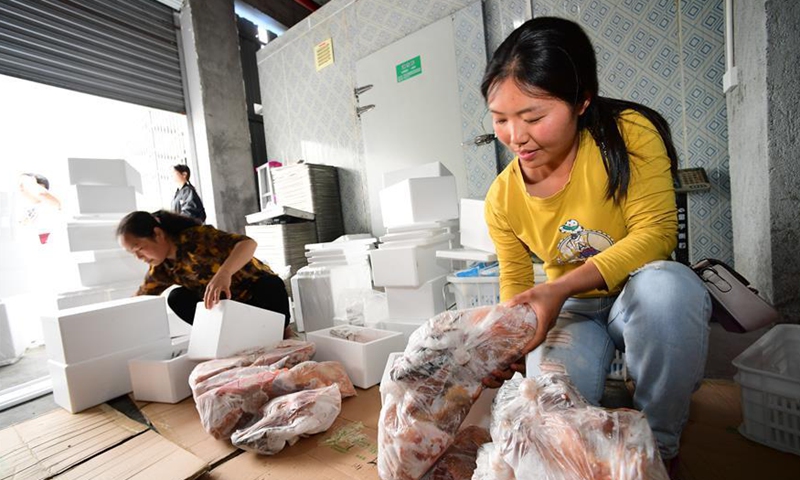China halts imports from second US poultry facility because of coronavirus
By Yin Yeping and Ma Jingjing Source: Global Times Published: 2020/9/16 13:24:43

Xiong Ying (R) ships frozen chicken meat from a refrigerated warehouse in Jinshan Village of Tianzhu County, southwest China's Guizhou Province, May 28, 2020. Xiong Ying had worked as an electronics technician in Guiyang before she quit the job in May 2018 and took over her family chicken farm. In November 2019, the chicken farm expanded with support from a government-backed poverty-relief fund. After the COVID-19 outbreak, Xiong has explored alternative ways to sell home-grown chickens -- the online store and livestream sales program run by the 30-year-old rural entrepreneur continue to make fortune amid the pandemic.Photo:Xinhua
China has suspended imports from US poultry exporter OK Foods' facility in Fort Smith because of the outbreak of coronavirus, the second US firm following Tyson Foods Inc to face the suspension.
Since September 13, OK Foods' Fort Smith poultry facility will not be eligible to export to China, according to a statement on the US Department of Agriculture website. The president of the USA Poultry & Egg Export Council said Tuesday that it's because coronavirus cases have been found among workers at the plant, Reuters reported.
OK Foods didn't immediately reply to Global Times' email seeking details by the time of writing. Industry data shows that OK Foods is one of the largest poultry production companies in the US, producing about 15 million pounds of ready-to-stock chicken on a weekly basis in 2019.
Due to cluster infections earlier in June, China's General Administration of Customs (GAC) suspended imports from Tyson Foods, the largest poultry manufacturer in the US.
Guo Huiyong, a senior industry analyst of agriculture products, told the Global Times on Wednesday that the suspension of meat imports from certain US factories are based on the decision for the prevention and control of the epidemic, which has not been an easy work to do for China.
"It had to make huge efforts to contain the epidemic and we need to stay highly alert for any risks from overseas to China," said Guo, noting that the imported goods have proved to be the sources of the outbreak like the ones in the wet market in Wuhan and that of Dalian.
"Therefore, I believe that it is the right thing to do for the prevention and control of the epidemic, with the strict inspection on the imported meats and animals in place," said Guo, refuting claims that there were political motivates behind the recent suspensions.
Gao Guan, vice president of the China Meat Association, told the Global Times that US meat exports to China are actually growing, including pork, poultry and beef.
China's meat imports reached 6.85 million tons by the end of August, exceeding last year's total, with the US also accounting for a large proportion, Gao said.
"There are several reasons for the increase, including a shortage of Chinese meat products and the phase-one trade agreement with the US," he said.
China imported about 6.18 million tons of meat last year, mainly from Brazil, European countries such as Spain and Germany, and the US, according to the association.
As a hotbed for the spread of the coronavirus, global meat industry has reported almost all of infections. The USA Today reported in May that at least 170 meatpacking plants in 29 states in the US had had one or more workers who tested COVID-19 positive. Bloomberg reported in August that one in five workers at Brazil's meat factories had been infected with COVID-19, citing union estimates.
In order to prevent cross-border spread of the global pandemic, China has suspended imports from a couple of meat processing plants in countries including Brazil and the UK.
RELATED ARTICLES:
Posted in: INDUSTRIES,BIZ FOCUS